初中七年级一般疑问句的讲解
人教版英语七年级上册:Unit 6 专题讲解:一般疑问句的用法及肯定、否定回答

能用“Yes”或者“No”来回答的疑问句,就是一般疑问句。
Step3:finetherulesand use them
下面我们来看看,陈述句如何变为一般疑问句:
1.陈述句:它们是可爱的。Theyare lovely.
变为一般疑问句:它们可爱吗?Arethey lovely?
二、让我们看看刚刚见过的5个一般疑问句,看看它们有什么共同的特点?
1. Is this the movie named The Lion King?
2. Are they good friends?
3. Are they lovely?
4. Can Simba be the Lion King?
5. Do you like this movie?
Yes, she can. / No, she can't.
2.Are you a student?
Yes, I am. / No, I'm not.
3.Do Tom and Jack have a baseball?
Yes, they do. / No, they don't.
笔记:
1.肯定回答:Yes,代词+be情助.
教师姓名
单位名称
填写时间
2020年8月25日
学科
英语
年级/册
七年级(上)
教材版本
人教版
课题名称
人教版七上Unit6一般疑问句的用法及肯定、否定回答
难点名称
借助does变一般疑问句时,谓语动词要还原
难点分析
从知识角度分析为什么难
母语对目标语产生负迁移:
七年级上册Unit3 含有Be动词的一般疑问句的初步运用

根据所提供的情景写出正确的句子
• 1,当你不确定你手上的东西是不是一把尺 子时候,你怎么咨询别人的意见?
Is this a ruler ?
• 2,当你不确定在远处的那个人是否是对方 的父亲,你怎么咨询对方的意见?
Is that your father ?
• 3,当你捡一块橡皮,你想问你的同桌是否 是他的时候,你怎么问?
含有be动词的陈述句变一般疑问句
一调二改三问号
1.“一调” :把be动词调至句首; 2. “二改”: 改大小写; 3. “三问号”:在句末加上问号。
含有be动词的陈述句变为一般疑问句的步骤
This is a pencil.
Is
this
a
pencil?
把下列的句子变为一般疑问句
1.I am Gina. Are you Gina? 2.I am a teacher . Are you a teacher? 3.This is my book. Is this your book? 4.My name is Mike. Is your name Mike?
Is this your eraser ?
总结1:含有be动词的一般疑问句
由“Be + 主语 + 其他部分?”构成要求对方
用 Yes 或 No 回答的疑问句。
总结2,含有 be一般疑问句的构成
• ①一调二改三问号 “一调” :把be动词调至句首; “二改”: 改大小写; “三问号”:在句末加上问号。 • ②特殊I变you, 特殊my变your。
特殊I变you, 特殊my变your
一般疑问句的肯定和否定回答:
1.Is he your brother ? Yes, he is. No, he isn’t
仁爱七年级一般疑问句特殊疑问句讲解

一般疑问句与特殊疑问句1.She is quiet.(改为一般疑问句) ______________________________2.He is seven years old_(对划线部分提问) _______________________3.Is Mr. Smith tall and strong?(作肯定回答) ______________________________4.Is Mr. Carter tall?(作否定回答)______________________________5.She is young. (否定句) ______________________________6.Is she active?(作否定回答) ______________________________7.She’s from China.(对划线部分提问) _____________________________8.That boy is my brother.否定句)______________________9.Is she young?(作否定回答) ______________________________10.I like vegetables.(改为否定句) ______________________________11.Are the apples sour?(作否定回答) ______________________________12.ChengLong is my favorite actor. (对划线部分提问)____________________________13.Can you play chess?(作肯定回答) ______________________________14.He can do the dishes.(改为一般疑问句) ______________________________15.Can you set the table?(作否定回答) ______________________________16.There is a big closet.(改为否定句) ______________________________17.There are blue curtains.(改为一般疑问句) ______________________________18.Is this your bedroom?(改为复数形式) ______________________________19.Is this your bedroom?(作肯定回答) ______________________________20.It’s a new desk.( 对划线部分提问) ______________________________21.Is it a walkman?(作否定回答) ______________________________22.There are some buildings in our school.(改为一般疑问句)_____________________________23.I like this park.(改为否定句) ______________________________24.Is there a river in your village?(作肯定回答)______________________________25.I like my village.(改为否定句) ______________________________26.There is a village.(改为一般疑问句) ______________________________27.He is our math teacher.(对划线部分提问) ______________________________28.I can water the flowers.(改为一般疑问句) ______________________________29.Are they young?(作肯定回答) ______________________________ 将下列句子改为一般疑问句,并做肯定和否定回答。
译林版2024新版七年级英语上册第05讲 一般疑问句 特殊疑问句和选择疑问句
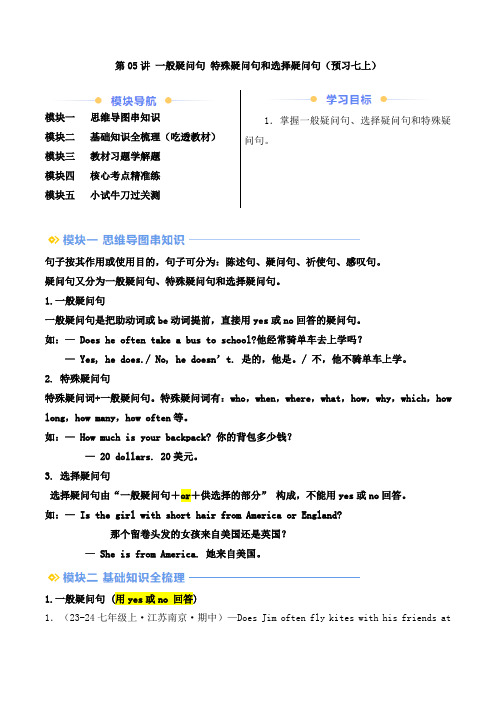
第05讲一般疑问句特殊疑问句和选择疑问句(预习七上)模块一思维导图串知识模块二基础知识全梳理(吃透教材)模块三教材习题学解题模块四核心考点精准练模块五小试牛刀过关测1.掌握一般疑问句、选择疑问句和特殊疑问句。
句子按其作用或使用目的,句子可分为:陈述句、疑问句、祈使句、感叹句。
疑问句又分为一般疑问句、特殊疑问句和选择疑问句。
1.一般疑问句一般疑问句是把助动词或be动词提前,直接用yes或no回答的疑问句。
如:— Does he often take a bus to school?他经常骑单车去上学吗?—Yes, he does./ No, he doesn’t. 是的,他是。
/ 不,他不骑单车上学。
2. 特殊疑问句特殊疑问词+一般疑问句。
特殊疑问词有:who,when,where,what,how,why,which,how long,how many,how often等。
如:— How much is your backpack? 你的背包多少钱?— 20 dollars. 20美元。
3. 选择疑问句选择疑问句由“一般疑问句+or+供选择的部分”构成,不能用yes或no回答。
如:— Is the girl with short hair from America or England?那个留卷头发的女孩来自美国还是英国?— She is from America. 她来自美国。
1.一般疑问句 (用yes或no 回答)1.(23-24七年级上·江苏南京·期中)—Does Jim often fly kites with his friends atweekends?—________. He likes flying kites very much.A.Yes, he is B.Yes, he does C.No, he doesn’t 2. 特殊疑问句(问什么答什么)2.(23-24七年级上·江苏盐城·期末)—________ woman is Daniel’s mother? —The one in the red coat.A.What B.Where C.Who D.Which3. 选择疑问句(选什么答什么)注意:不要错看成一般疑问句。
人教版英语七年级上册一般疑问句和特殊疑问句

一般疑问句和特殊疑问句【概念引入】英语中的句子按照句式可以分为陈述句、疑问句、祈使句和感叹句。
一、陈述句用来说明事实或说话人的看法;分为肯定句和否定句。
例如:My name is Lily. 我的名字叫莉莉。
(肯定句)She isn’t a teacher. 她不是一个老师。
(否定句)二、祈使句用来表示请求、命令、劝告和建议等。
例如:Open the door please! 请打开门。
三、感叹句用来表达强烈的感情。
例如:What a beautiful girl she is!她真是个漂亮的女孩儿啊!四、疑问句用来提出问题。
例如:Are you my new teacher? 你是我的新老师吗?本节课,我们将重点讲解疑问句的用法。
【用法讲解】疑问句可以分为一般疑问句、特殊疑问句、选择疑问句和附加疑问句。
本册书中我们重点学习的是一般疑问句和特殊疑问句。
1.一般疑问句。
(1)什么是一般疑问句?可以用Yes或者No来回答的疑问句是一般疑问句。
一般疑问句读的时候往往要用升调;译成汉语的时候常可以译为“……吗?”。
例如:-Are you a student? 你是个学生吗?-Yes, I am. 是的,我是。
-Can you speak English? 你会说英语吗?-Yes, I can. 是的,我会。
-Do you go to school every day? 你每天都上学吗?-No, I don’t. 不,不是。
(2)如何将陈述句变成一般疑问句?①句中有be动词(am,is,are,was,were等)、助动词(do,does,did,have,had等)或情态动词(can,must,will,may等)时,将其提到句首,句末加上问号即可。
例如:She is a clever girl. 她是个聪明的女孩。
→Is she a clever girl? 她是个聪明的女孩吗?I can swim. 我会游泳。
人教版初中英语七年级上册语法知识点
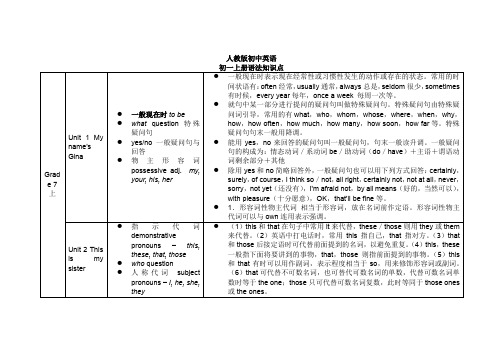
have表示“有”时,其否定形式有两种:在其后直接加not,但常用于非正式用语中;利用助动词do加not。
②如果句子的谓语是实义动词,在谓语动词前加don't,doesn't,didn't。
③no,never,seldom,hardly,nobody,little,few,nothing等否定词也可以构成否定形式。
1.表示经常性或习惯性发生的动作2.表示现在存在的状态或情况3.表示正在发生的动作或存在的状态4.表示客观事实、真理和自然现象5.用于表示较固定的、按计划、规定将要发生的动作,但只限于begin,come,go,leave,arrive,stop,return,close,open,take,start,take,place等少数动作,6.用于if,unless,once,even if(即使)等引导的条件状语从句,when,before,until,as soon as,the moment(一……就)等引导的时间状语从句,no matter+wh-/-how-或wh-ever/however等引导的让步状语从句中,代替一般将来时
人教版初中英语
初一上册语法知识点
Grade 7
上
Unit 1 My name’s Gina
七年级上册英语正式篇第三单元知识点
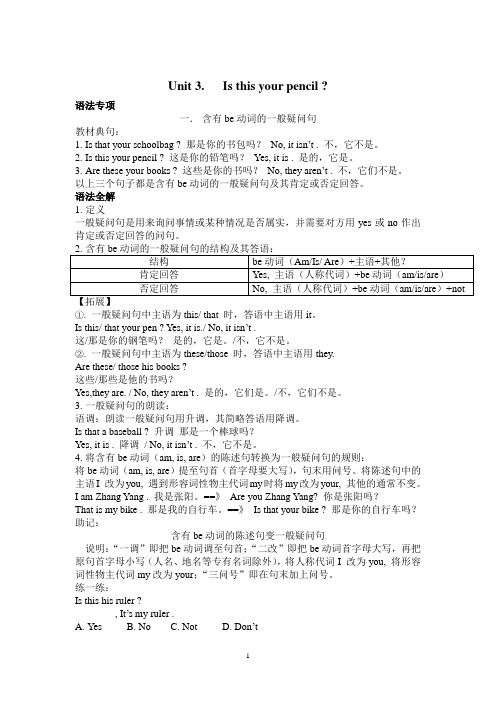
Unit 3. Is this your pencil ?语法专项一.含有be动词的一般疑问句教材典句:1.Is that your schoolbag ? 那是你的书包吗?No, it isn’t . 不,它不是。
2.Is this your pencil ? 这是你的铅笔吗?Yes, it is . 是的,它是。
3.Are these your books ? 这些是你的书吗?No, they aren’t . 不,它们不是。
以上三个句子都是含有be动词的一般疑问句及其肯定或否定回答。
语法全解1.定义一般疑问句是用来询问事情或某种情况是否属实,并需要对方用yes或no作出肯定或否定回答的问句。
2.含有be动词的一般疑问句的结构及其答语:结构be动词(Am/Is/ Are)+主语+其他?肯定回答Yes, 主语(人称代词)+be动词(am/is/are)否定回答No, 主语(人称代词)+be动词(am/is/are)+not 【拓展】①. 一般疑问句中主语为this/ that 时,答语中主语用it。
Is this/ that your pen ? Yes, it is./ No, it isn’t .这/那是你的钢笔吗?是的,它是。
/不,它不是。
②. 一般疑问句中主语为these/those 时,答语中主语用they.Are these/ those his books ?这些/那些是他的书吗?Yes,they are. / No, they aren’t . 是的,它们是。
/不,它们不是。
3.一般疑问句的朗读:语调:朗读一般疑问句用升调,其简略答语用降调。
Is that a baseball ? 升调那是一个棒球吗?Yes, it is . 降调/ No, it isn’t . 不,它不是。
4.将含有be动词(am, is, are)的陈述句转换为一般疑问句的规则:将be动词(am, is, are)提至句首(首字母要大写),句末用问号。
人教部编版初中七年级语法一般疑问句和特殊疑问句总结
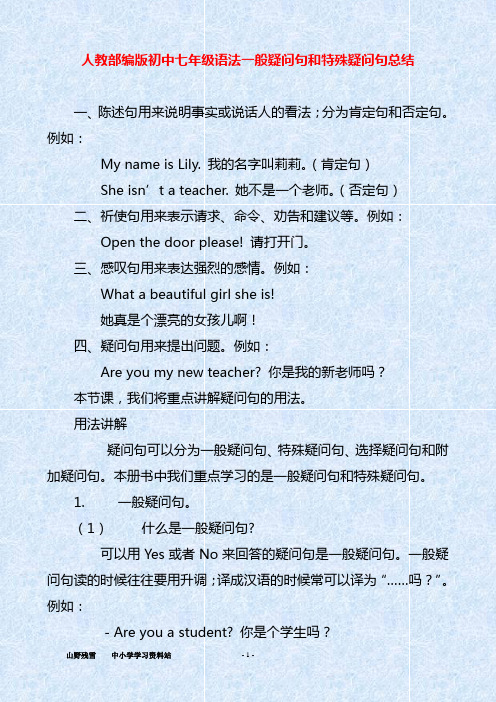
人教部编版初中七年级语法一般疑问句和特殊疑问句总结一、陈述句用来说明事实或说话人的看法;分为肯定句和否定句。
例如:My name is Lily. 我的名字叫莉莉。
(肯定句)She isn’t a teacher. 她不是一个老师。
(否定句)二、祈使句用来表示请求、命令、劝告和建议等。
例如:Open the door please! 请打开门。
三、感叹句用来表达强烈的感情。
例如:What a beautiful girl she is!她真是个漂亮的女孩儿啊!四、疑问句用来提出问题。
例如:Are you my new teacher? 你是我的新老师吗?本节课,我们将重点讲解疑问句的用法。
用法讲解疑问句可以分为一般疑问句、特殊疑问句、选择疑问句和附加疑问句。
本册书中我们重点学习的是一般疑问句和特殊疑问句。
1. 一般疑问句。
(1)什么是一般疑问句?可以用Yes或者No来回答的疑问句是一般疑问句。
一般疑问句读的时候往往要用升调;译成汉语的时候常可以译为“……吗?”。
例如:-Are you a student? 你是个学生吗?-Yes, I am. 是的,我是。
-Can you speak English? 你会说英语吗?-Yes, I can. 是的,我会。
-Do you go to school every day? 你每天都上学吗?-No, I don’t. 不,不是。
(2)如何将陈述句变成一般疑问句?①句中有be动词(am,is,are,was,were等)、助动词(do,does,did,have,had等)或情态动词(can,must,will,may等)时,将其提到句首,句末加上问号即可。
例如:he is a clever girl. 她是个聪明的女孩。
→Is she a clever girl? 她是个聪明的女孩吗?I can swim. 我会游泳。
→Can you swim? 你会游泳吗?②如果句中没有be动词、助动词或情态动词,则要根据不同的时态在句首加上相应的助动词来构成一般疑问句。
英语人教新目标七年级上册一般疑问句(1)
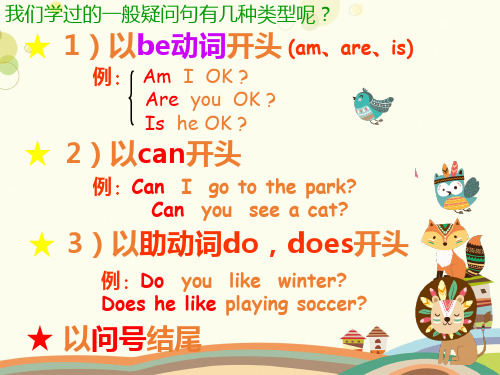
1.some He has some books.
2.and
Does he have any books? I have a pen and a pencil.
Do you have a pen or a pencil?
3.does(do) He often does homework at night.
Does he often do homework at night?
Practice 1. These are some photos.
Are these any photos ?
2.Mary does her homework at school.
Does Mary do her homework at school?
3.He goes to school with Tom. Does he go to school with Tom?
4.His mother often plays volleyball.
Does his mother often play volleyball?
一加,二改,三问号!
总结
如 何 改 一 般 疑 问 句 ?
3. you can sing and dance. Can I sing or dance?
4. He plays soccer.
Does he play soccer ?
5. We like English. Do you like English ?
回顾小结
•一提、二改、三问号。 •一加、二改、三问号。
我们学过的一般疑问句有几种类型呢?
1)以be动词开头 (am、are、is)
例: Am I OK ? Are you OK ? Is he OK ?
七年级英语一般疑问句和特殊疑问句ppt课件
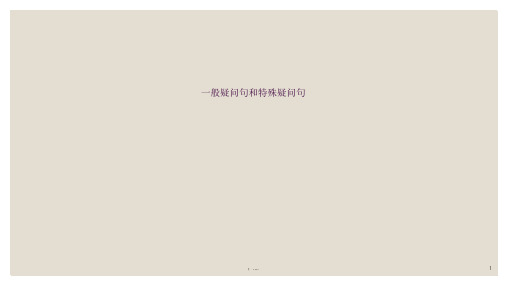
◦ ________________________________________ 5.We must follow the traffic rules.
◦ ________________________________________ 6.I must wash my hands before lunch.
加doesn?tdidnt的句子注意句子动词要变成原观察一下这些肯定句变成一般疑问句的规律是怎么样的
一般疑问句和特殊疑问句
;....
1
观察一下,这些肯定句变成否定句的规律是怎么样的?
;....
2
◦ be动词
;....
3
◦ 肯定句: ◦ They are in the park. ◦ 否定句: ◦ They are not in the park.
1. There is a big clock.
Is there a big clock
?
2.This is my bag.
Is this your bag
?
3.I am a student
Are you a student
?
1. Be 动词提到句首,其他照抄,句尾加问号。 2. I 变为you,my 变为your. some 变any.
;....
29
◦ 特殊疑问词的用法
◦ 例句 who 谁问人的身份,姓名等 ◦ He is LiLie. ◦ Who is he ? ◦ He is my brother. ◦ Who is he ?
;....
七年级英语一般疑问句完整版
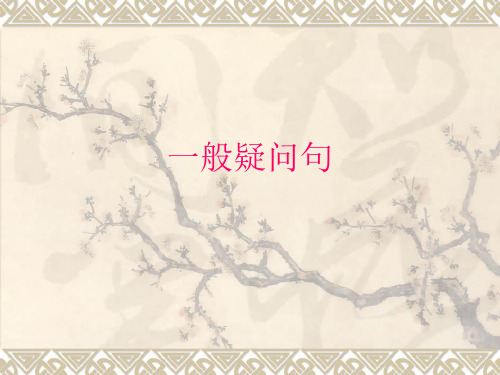
❖ 7. I go to work by bike every day. ❖ Do he go to work by bike every day ? ❖ Yes, He does. No, he doesn’t. ❖ 8.she goes to school by bus . ❖ Does she go to school by bus ? ❖ Yes, she does. No, she doesn’t. ❖ 9.I do my homework after school. ❖ Do you do your homework after school ? ❖ Yes, I do. No, I don’t.
❖ 总结:1.人称的变化:原句中是 I 的要变为 you(你), 是 we 的要变为You(你们); 是my 的要变为your(你的),原句中是our ( 我们的)要改为your (你们的)。
❖ 2. 加助动词do的某种形式构成的一般疑问 句,在回答时不能使用原句中的谓语动词 (即行为动词)来作答,而是要使用助动 词来作答。
❖ 4. I have a cat. ❖ Dou you have a cat? ❖ Yes, I do. No, I don’t. ❖ 5.They can swim(游泳) ❖ Can they swim? ❖ Yes, they can. No, they can’t. ❖ 6. She likes dog. ❖ Does she like dog ? ❖ Yes, she does . No, She does not \ doesn’t.
❖ I can play baseball.
❖ Can you play baseball ?
❖ Yes, I can. No, I can not \ can’t. ❖ can’t 是 can not的缩写。
七年级英语上一般疑问句
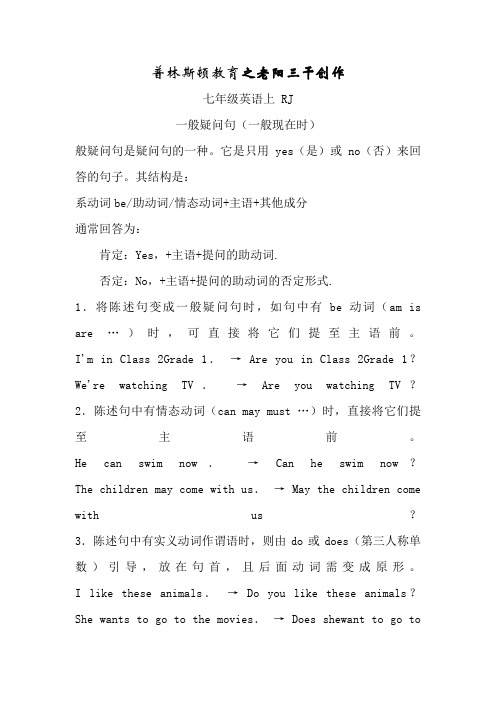
普林斯顿教育之老阳三干创作七年级英语上 RJ一般疑问句(一般现在时)般疑问句是疑问句的一种。
它是只用yes(是)或no(否)来回答的句子。
其结构是:系动词be/助动词/情态动词+主语+其他成分通常回答为:肯定:Yes,+主语+提问的助动词.否定:No,+主语+提问的助动词的否定形式.1.将陈述句变成一般疑问句时,如句中有be 动词(am is are …)时,可直接将它们提至主语前。
I'm in Class 2Grade 1.→ Are you in Class 2Gra de 1?We're watching TV.→ Are you watching TV?2.陈述句中有情态动词(can may must …)时,直接将它们提至主语前。
He can swim now.→ Can he swim now?The children may come with us.→ May the children come with us?3.陈述句中有实义动词作谓语时,则由do或does(第三人称单数)引导,放在句首,且后面动词需变成原形。
I like these animals.→ Do you like these animals?She wants to go to the movies.→ Does shewant to go tothe movies?需要直接变更的词语I /me酿成you we /us酿成you my酿成your our酿成youram酿成are some酿成any and酿成orthis酿成that these 酿成those陈述句的否定形式(一般现在时)1.含有系动词的句子在变否定句时只须“在系动词的后边加上not”,前面的几个了陈述句变否定句分别为I’m a Chineseboy.→ I’m not a Chinese boy.She is twelve.→ Sheisn’t twelve.2.含有情态动词的句子( can ), 在变否定句时直接在情态动词的后边加上notShe can play basketball.→She can not play basketball.His mo ther’s cousin cansing many English songs.→His mother’s cousin can not sing many English songs.3.○1含有行为动词的句子在变否定句时只须在行为动词前加don’t .We don’t have many friends.→We don’t have many friends.The students don’t take their books to school.→Thestud ents don’t take their books to school.○2含有行为动词的句子,当主语是第三人称单数时,变否定句时“在行为动词前面加doesn’t , 且后面动词需变成原形”。
七年级上册英语一般疑问句知识点
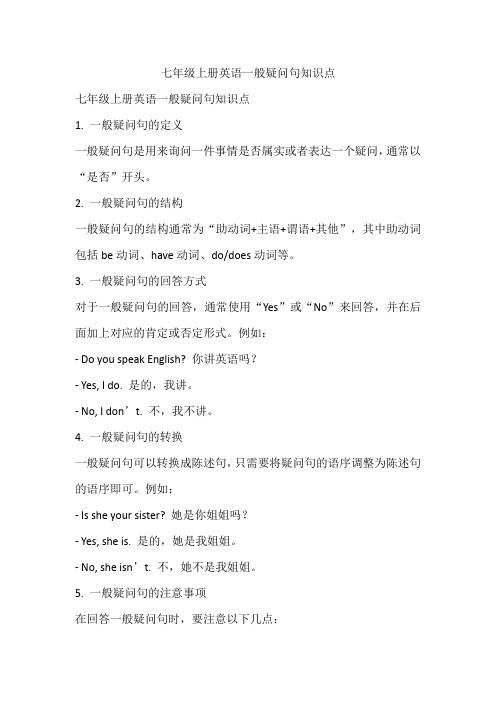
七年级上册英语一般疑问句知识点
七年级上册英语一般疑问句知识点
1. 一般疑问句的定义
一般疑问句是用来询问一件事情是否属实或者表达一个疑问,通常以“是否”开头。
2. 一般疑问句的结构
一般疑问句的结构通常为“助动词+主语+谓语+其他”,其中助动词包括be动词、have动词、do/does动词等。
3. 一般疑问句的回答方式
对于一般疑问句的回答,通常使用“Yes”或“No”来回答,并在后面加上对应的肯定或否定形式。
例如:
- Do you speak English? 你讲英语吗?
- Yes, I do. 是的,我讲。
- No, I don’t. 不,我不讲。
4. 一般疑问句的转换
一般疑问句可以转换成陈述句,只需要将疑问句的语序调整为陈述句的语序即可。
例如:
- Is she your sister? 她是你姐姐吗?
- Yes, she is. 是的,她是我姐姐。
- No, she isn’t. 不,她不是我姐姐。
5. 一般疑问句的注意事项
在回答一般疑问句时,要注意以下几点:
-首先要听清问题,并理解问题的意思;
-回答时要保持礼貌和尊重;
-对于不知道或不确定的问题,可以委婉地回答或请求对方解释;-注意时态和语序,保持语句通顺。
七年级英语上否定句及一般疑问句知识点
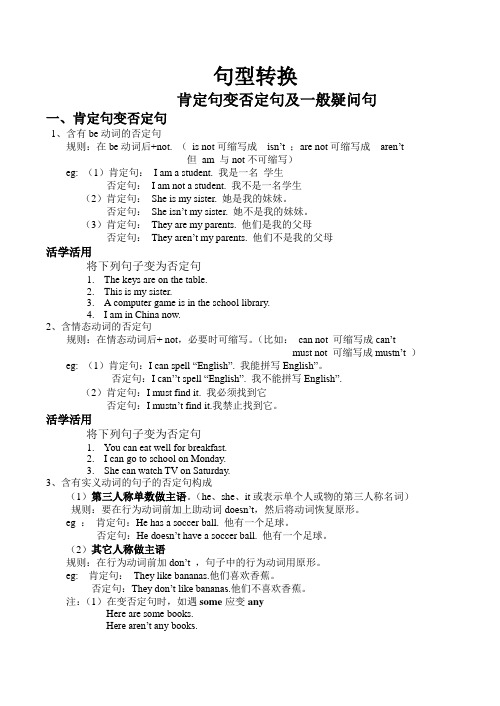
句型转换肯定句变否定句及一般疑问句一、肯定句变否定句1、含有be动词的否定句规则:在be动词后+not. (is not可缩写成isn’t ;are not可缩写成aren’t但am 与not不可缩写)eg: (1)肯定句:I am a student. 我是一名学生否定句:I am not a student. 我不是一名学生(2)肯定句:She is my sister. 她是我的妹妹。
否定句:She isn’t my sister. 她不是我的妹妹。
(3)肯定句:They are my parents. 他们是我的父母否定句:They aren’t my parents. 他们不是我的父母活学活用将下列句子变为否定句1.The keys are on the table.______________________________________2.This is my sister.____________________________________________3. A computer game is in the school library.___________________________________4.I am in China now.________________________________________2、含情态动词的否定句规则:在情态动词后+ not,必要时可缩写。
(比如:can not 可缩写成can’tmust not 可缩写成mustn’t )eg: (1)肯定句:I can spell “English”. 我能拼写English”。
否定句:I can’’t spell “English”.我不能拼写English”.(2)肯定句:I must find it. 我必须找到它否定句:I mustn’t find it.我禁止找到它。
活学活用将下列句子变为否定句1.You can eat well for breakfast.________________________________2.I can go to school on Monday.__________________________________3.She can watch TV on Saturday.__________________________________3、含有实义动词的句子的否定句构成(1)第三人称单数做主语。
英语人教版七年级上册一般现在时的一般疑问句及其回答
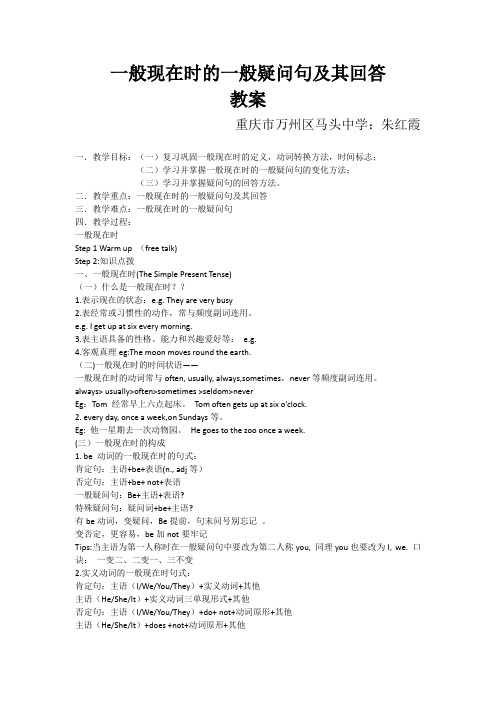
一般现在时的一般疑问句及其回答教案重庆市万州区马头中学:朱红霞一.教学目标:(一)复习巩固一般现在时的定义,动词转换方法,时间标志;(二)学习并掌握一般现在时的一般疑问句的变化方法;(三)学习并掌握疑问句的回答方法。
二.教学重点:一般现在时的一般疑问句及其回答三.教学难点:一般现在时的一般疑问句四.教学过程:一般现在时Step 1 Warm up (free talk)Step 2:知识点拨一、一般现在时(The Simple Present Tense)(一)什么是一般现在时??1.表示现在的状态:e.g. They are very busy2.表经常或习惯性的动作,常与频度副词连用。
e.g. I get up at six every morning.3.表主语具备的性格、能力和兴趣爱好等:e.g.4.客观真理eg:The moon moves round the earth.(二)一般现在时的时间状语——一般现在时的动词常与often, usually, always,sometimes,never等频度副词连用。
always> usually>often>sometimes >seldom>neverEg:Tom 经常早上六点起床。
Tom often gets up at six o’clock.2. every day, once a week,on Sundays等。
Eg: 他一星期去一次动物园。
He goes to the zoo once a week.(三)一般现在时的构成1. be 动词的一般现在时的句式:肯定句:主语+be+表语(n., adj等)否定句:主语+be+ not+表语一般疑问句:Be+主语+表语?特殊疑问句:疑问词+be+主语?有be动词,变疑问,Be提前,句末问号别忘记。
变否定,更容易,be加not要牢记Tips:当主语为第一人称时在一般疑问句中要改为第二人称you, 同理you也要改为I, we. 口诀:一变二、二变一、三不变2.实义动词的一般现在时句式:肯定句:主语(I/We/You/They)+实义动词+其他主语(He/She/It)+实义动词三单现形式+其他否定句:主语(I/We/You/They)+do+ not+动词原形+其他主语(He/She/It)+does +not+动词原形+其他一般疑问句:Do+主语(I/we/you/they)+动词原形+其他?Does+主语(he/she/it)+动词原形+其他?特殊疑问句:疑问词+ do/does+主语+动词原形+其他复习动词三单式1)动词三单形式变化规律1. 一般情况下,直接在词尾加()eg: work---works2. 以x, s, o, sh, ch结尾的动词,在词尾加( )eg: wash—washes watch—watches3. 以辅音字母加y 结尾的动词,把y 变为( ) 加( ) eg:study—studies练习:do --fix-- go -- read -- look-- wash-- pass-- play-- enjoy-- watch-- teach-- carry--box-- study-- swim--谓语为实义动词,变疑问,一二人称和复数do 提前,三单把does 来帮助,句末问号别忘记变否定,也容易,do/does加not就OK!Step3、拓展练习How much______it______?(cost)2.The shop___________(close)at this time of day.3.My teacher often_________(tell)us not to play on thestreet.4.Light___________(travel)much faster than sound.Step4 一般现在时专项练习1.This is my pencil ? (变一般疑问句your pencil ?2. These r ed socks are Kate’s . (变一般疑问句socks Kate’s ?3. I want to buy a big green bag . (变特殊疑问句you want to buy ?4. Mary does not have any books . (变肯定句)Mary books .5. The clothing shop is on sale . (变为否定句)6. She likes the black bag very much . (变为否定句)7. I buy the pants for only 50 Yuan. (用she改写句子)the pants for only 50 Yuan.8. It’对画线部分提问)9. 对画线部分提问)Lily and Lucy ?10. Her dog is 2 years and 5 months old . (变为否定句)Her dog 2 years and 5 months old .11. I usually get up at seven o’clock . (用he改写句子)at seven o’clock .12. He often has hamburger and apples for dinner . (变为一般疑问句)13. My family always like thrillers . (对画线部分提问)your family always like ?14. Jane’s sister wants to see the comedy . (变为一般疑问句)’15. 对画线部分提问) Maria and Jack come to this school ?16. 对画线部分提问Titanic ?17. I think this documentary is boring . (变复数句)think boring .18. 对画线部分提问) ?19. Julia and her mother can live (居住) in the same city . (变一般疑问句)Julia and her mother live in the same city ?20. The teacher wants to join a music club . (变为特殊疑问句)the teacher want to join ?二.用be动词的适当形式填空。
七年级英语语法精讲:一般疑问句
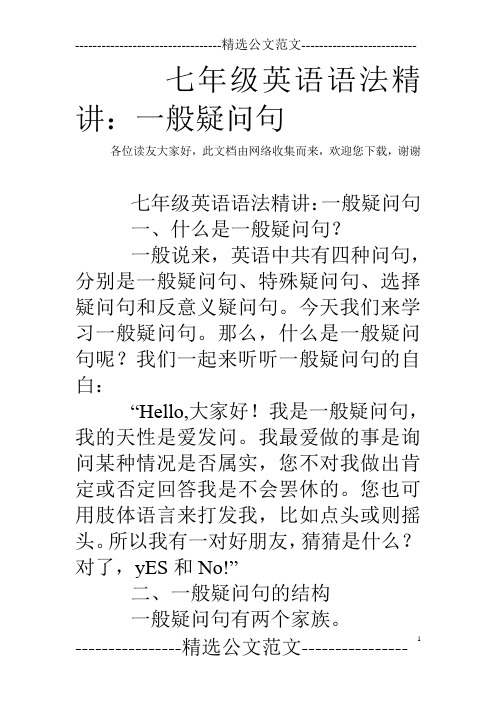
七年级英语语法精讲:一般疑问句各位读友大家好,此文档由网络收集而来,欢迎您下载,谢谢七年级英语语法精讲:一般疑问句一、什么是一般疑问句?一般说来,英语中共有四种问句,分别是一般疑问句、特殊疑问句、选择疑问句和反意义疑问句。
今天我们来学习一般疑问句。
那么,什么是一般疑问句呢?我们一起来听听一般疑问句的自白:“Hello,大家好!我是一般疑问句,我的天性是爱发问。
我最爱做的事是询问某种情况是否属实,您不对我做出肯定或否定回答我是不会罢休的。
您也可用肢体语言来打发我,比如点头或则摇头。
所以我有一对好朋友,猜猜是什么?对了,yES和No!”二、一般疑问句的结构一般疑问句有两个家族。
第一家族为含be动词或情态动词的一般疑问句,其结构为:be+主语+其它部分?情态动词+主语+动词原形+其它部分?肯定回答用“yes,主语+be/情态动词.”,否定回答用“No,主语+be/情态动词+not.”。
be或情态动词和not可用缩写形式,主要有isn’t,aren’t,wasn’t,weren’t,can’t,mustn’t,needn’t 等。
Eg1.问句:IsthisyourEnglishbook?肯答:yes,itis.否答:No,itisn`t.Eg2.问句:AretheseyourEnglishbooks?肯答:yes,theyare.否答:No,theyaren’t.Eg3.问句:canyouspeakEnglish?肯答:yes,Ican.否答:No,Ican’t.注意例句1和例句2,在回答时必须将this/that与these/those分别变为it和they。
另一家族为含行为动词(或称为实义动词)的一般疑问句,其结构为:助动词+主语+动词原形+其它?肯定回答用“yes,主语+do/does.”,否定回答用“No,主语+don/doesnot.”。
助动词也常用缩写形式,主要有don’t,doesn’t,didn’t等。
人教版英语七年级上册关于一般疑问句的回答突破改(含答案)
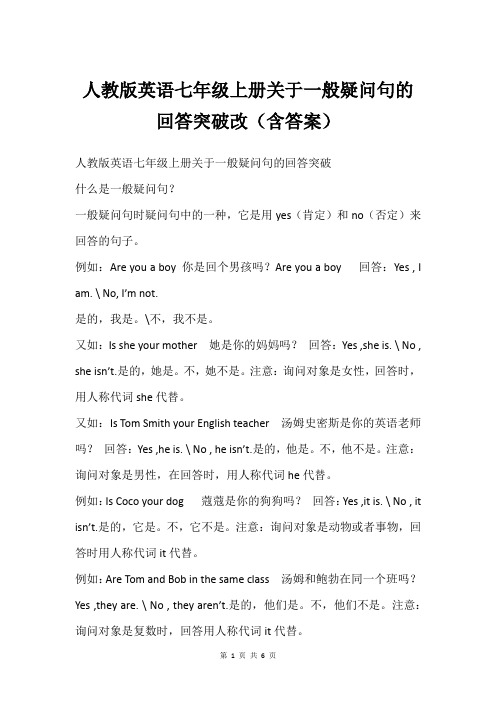
人教版英语七年级上册关于一般疑问句的回答突破改(含答案)人教版英语七年级上册关于一般疑问句的回答突破什么是一般疑问句?一般疑问句时疑问句中的一种,它是用yes(肯定)和no(否定)来回答的句子。
例如:Are you a boy 你是回个男孩吗?Are you a boy 回答:Yes , I am. \ No, I’m not.是的,我是。
\不,我不是。
又如:Is she your mother 她是你的妈妈吗?回答:Yes ,she is. \ No , she isn’t.是的,她是。
不,她不是。
注意:询问对象是女性,回答时,用人称代词she代替。
又如:Is Tom Smith your English teacher 汤姆史密斯是你的英语老师吗?回答:Yes ,he is. \ No , he isn’t.是的,他是。
不,他不是。
注意:询问对象是男性,在回答时,用人称代词he代替。
例如:Is Coco your dog 蔻蔻是你的狗狗吗?回答:Yes ,it is. \ No , it isn’t.是的,它是。
不,它不是。
注意:询问对象是动物或者事物,回答时用人称代词it代替。
例如:Are Tom and Bob in the same class 汤姆和鲍勃在同一个班吗?Yes ,they are. \ No , they aren’t.是的,他们是。
不,他们不是。
注意:询问对象是复数时,回答用人称代词it代替。
关于一般疑问句的回答。
在七年级上册阶段,我们只学习三种类型的一般疑问句,它们分别是:、含有情态动词的一般疑问句。
例如:I can say my ABCs. 其一般疑问句为:Can you say your ABCs回答:Yes , I can. \ No , I can’t.举一反三:根据提示,完成句子。
Can the boy go home at 5:00 (做否定回答)__________ , ________ ___________.Must she do homework at school (做肯定回答)_________ , ________ ________.They can go there by bus.(该为一般疑问句并做肯定回答)_________ they _______ there by bus回答:___________ , _________ _________.参考答案:No , he can’t. 2、Yes ,she must. 3、Can ; go ; Yes ; they ;can温馨提示:can引导的句子,没有人称和数的区别:I can \ she can \ you can \ he can \ they can、含有be动词(is \ am\ are)的一般疑问句。
七年级英语教材版第4课 一般疑问句的自我介绍
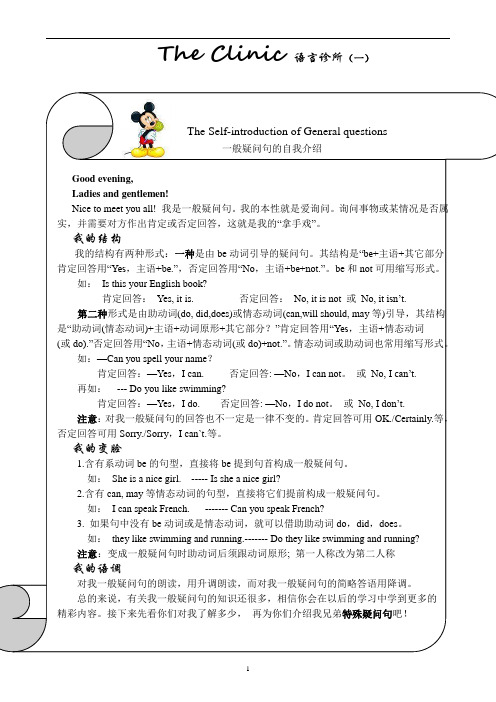
The Clinic语言诊所(一)把下列句子变成一般疑问句.1. They are playing basketball on the playground..2. They can borrow books from the library..3. He has many English novels in his family..4. They go to school on foot everyday..5. I do my homework alone..6. Lynn lives in Shenzhen..7. It is a wonderful skirt..8. I will pass on a message to her..9. I would like a cup of milk, please..特殊疑问句特殊疑问句的结构:特殊疑问词+ 一般疑问句如: Where is your teacher?When does Tom get up every morning?What did you buy last Sunday?特殊疑问词列表1) 对指物名词或谓语动词提出疑问,疑问词用what .①The twins were making a kite when their mother came in. (划线提问)the twins when their mother came in?②Mrs. Turner asked her son to buy some eggs for supper. (划线提问)Mrs. Turner ask her son ?2) 对名词前定语提出疑问,疑问词应用which,而且必须和名词连用。
I'm going to take the shirt on the right.(划线提问)are you going to take?3) 对指人名词或代词提问用who。
七年级英语上否定句及一般疑问句知识点
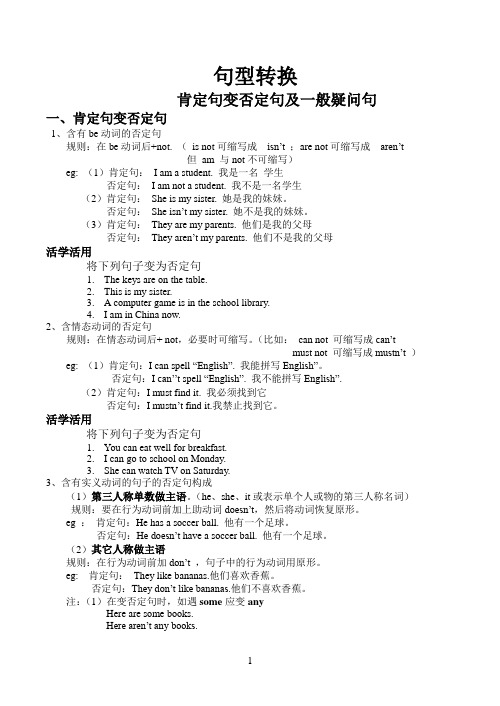
句型转换肯定句变否定句及一般疑问句一、肯定句变否定句1、含有be动词的否定句规则:在be动词后+not. (is not可缩写成isn’t ;are not可缩写成aren’t但am 与not不可缩写)eg: (1)肯定句:I am a student. 我是一名学生否定句:I am not a student. 我不是一名学生(2)肯定句:She is my sister. 她是我的妹妹。
否定句:She isn’t my sister. 她不是我的妹妹。
(3)肯定句:They are my parents. 他们是我的父母否定句:They aren’t my parents. 他们不是我的父母活学活用将下列句子变为否定句1.The keys are on the table.______________________________________2.This is my sister.____________________________________________3. A computer game is in the school library.___________________________________4.I am in China now.________________________________________2、含情态动词的否定句规则:在情态动词后+ not,必要时可缩写。
(比如:can not 可缩写成can’tmust not 可缩写成mustn’t )eg: (1)肯定句:I can spell “English”. 我能拼写English”。
否定句:I can’’t spell “English”.我不能拼写English”.(2)肯定句:I must find it. 我必须找到它否定句:I mustn’t find it.我禁止找到它。
活学活用将下列句子变为否定句1.You can eat well for breakfast.________________________________2.I can go to school on Monday.__________________________________3.She can watch TV on Saturday.__________________________________3、含有实义动词的句子的否定句构成(1)第三人称单数做主语。
- 1、下载文档前请自行甄别文档内容的完整性,平台不提供额外的编辑、内容补充、找答案等附加服务。
- 2、"仅部分预览"的文档,不可在线预览部分如存在完整性等问题,可反馈申请退款(可完整预览的文档不适用该条件!)。
- 3、如文档侵犯您的权益,请联系客服反馈,我们会尽快为您处理(人工客服工作时间:9:00-18:30)。
一般疑问句
一般疑问句定义:能用Yes 或者No来回答的句子
分类:含有be的一般疑问句和不含be的一般疑问句一、含有be(am,is,are)的一般疑问句
结构:is +主语(表示第三人称单数)+其它
Is this/ that / it + 其它is she / he +其它?
Yes ,it is Yes ,she / he is
No ,it isn’t No , she / he isn’t Eg . 例如
肯定句:this / that is a pen .
一般疑问句Is this / that a pen ?那是一只钢笔吗?
Yes ,it is 是的,它是(注意这里的it is一般不缩写成it’s)
No ,it isn’t 不,它不是
Is she in the classroom?她在房间里吗?
Yes , she is 是的,她是(在房间里)
No , she isn’t 不,她不是(在房间里)
2 . 结构:Are + 主语(表示复数) + 其它
Are these / those / they / + 其它
Yes ,they are . ?
No ,they aren’t
Are you……?Are we ……?
Yes ,I am . Yes , we are
No , I am not No , we aren’t
Eg Are these your books ? 那些是你的书吗?
Yes ,they are 是的,他们是
No ,they aren’t 不,他们不是
Are you a student ? 你是一个学生吗?
Yes , I am 是的,我是
No , I am not 不,我不是
练习
is ----- your book ?Yes ,---- is
-----it your hat ?No , it --------
------they in the room ? Yes , they -------
-----those her keys ? No , ------aren’t
……
小结: 含有be的的句子变疑问句,只需要把be动词提到句首,句号变成问号,并且注意人称的变化
二、不含be的一般疑问句,需要借助于助动词do或does
第三人称单数用does ,其它人称都用do
结构:does +she/ he / lily +动词原形+其它
Yes ,she / he does
No , she / he doesn’t
Do you / they / we / I + 动词原形+其它
Yes ,you / they / we / I do
No , you / they / we / I don’t
Eg 例如
她有一个包吗?Does she have a bag ?
是的,她有Yes ,she does
不,她没有No , she doesn’t
你有一个包吗?Do you have a bag ?
是的,我有Yes ,I do
不,我没有No , I don’t
小结:不含be的一般疑问句,需要借助于助动词do或does
第三人称单数用does ,其它人称都用do,而后面的谓语动词需用动词原形。
练习略。
